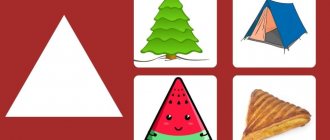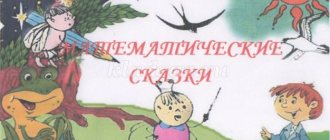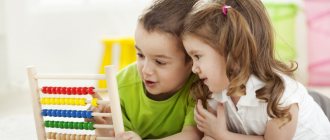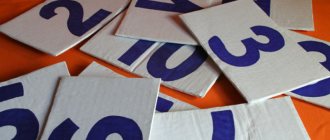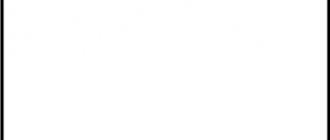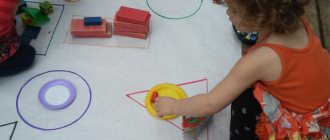The requirements of the modern school curriculum are such that by the time a child enters first grade, elementary mathematical concepts must be formed. These include knowledge of numbers and basic symbols, ability to count within ten and cope with simple math problems that require addition and subtraction for children aged 5-6 years. At the same time, as is known, preschool children absorb information that is presented in a playful form much faster and easier. Specialists from the development site “Razumeikin” sought to take these factors into account when preparing online tasks for teaching mathematics to 5-year-old children. All exercises are presented in an easy, interesting way.
The “Other Mathematical Concepts” section introduces the child to the basic symbols (“greater than,” “less than,” and “equal to”) and teaches them how to use them. Using our website you can study easily and productively. By completing math problems, 6-year-old preschoolers learn ordinal counting and the basics of measuring length, mass, and volume. Children learn to understand and analyze the dependence of the measurement result on the measurement value. Assignments as part of the online mathematics training program for children 5-6 years old give an idea of the basic geometric shapes and bodies in pictures, as well as a basic concept of tables.
When developing a set of exercises for children of senior preschool age, our specialists tried to make them not only as understandable and exciting as possible, but also truly useful in practical terms. Almost all online math tasks for 6-year-old children are designed in the form of a game and have detailed explanations. You can find them in the training video before the exercise. An explanation for the test tasks in the section “Mathematics for preschoolers 5-6 years old” is also given if the answer the child gave turned out to be incorrect or insufficiently complete.
How are results assessed?
For completing mathematics assignments for preschoolers 5 years old, the Razumeikin website provides a whole system of rewards. We are convinced that it helps to increase children's interest in learning and create positive motivation.
By completing the tasks in the “Mathematics for preschoolers 5 years old” section, kids receive a reward. Our website provides medals, cups, pennants and certificates.
Almost all task-games in the “Mathematics for 6-year-old children” section are graded depending on the attempt at which the child gave the correct answer. If necessary, you can return to the completed exercise. By doing the task in the section “Mathematics for preschoolers 5-6 years old” again, the child will be able to improve the previous result and receive a higher reward.
Before you start doing the exercises in the “Mathematics for children 5-6 years old” section, we recommend taking a test. The results obtained will help you understand which topics need to be discussed in more detail. In addition, parents will be able to determine which tasks in the “Mathematics for preschoolers 6 years old” section should be completed first.
Methodological material “Collection of problems”. Mathematics for children 5-7 years old.
Author: Enina Svetlana Nikolaevna,
teacher of MBDOU "General developmental kindergarten No. 112", Voronezh.
This material is designed for children aged 5–7 years who are preparing to enter school.
It is recommended for a wide range of specialists working with children of this age - educators, additional education teachers, teachers, as well as parents who want to prepare their child for school.
Goal: to develop the ability to solve arithmetic problems involving addition and subtraction within ten.
Collection of problems. Mathematics for children 5-7 years old.
1. There were 8 pikes in the lake. Ivan caught 1 pike. How many pike are left in the lake?
2. The fisherman caught 7 crucian carp and put them in a bucket. Vaska the cat stole 6 crucian carp. How many crucian carp are left in the bucket?
3. To cook the fish soup, 7 of the eight carp caught were put in a pan, the rest were given to the cat. How many carp did the cat get for dinner?
4. Dad brought 4 perches and 3 roach from fishing. How many perches and roaches did dad catch?
5. Grandma bought 8 crucian carp at the store and fried half of them for lunch. How many crucian carp are left?
6. There were 7 fish on the display window in the store, 4 of them were pike, the rest were bream. How many bream were on the display?
7. In the yard, 3 white and 6 gray pigeons were pecking for crumbs. How many white and gray pigeons dined in the yard?
8. 9 sparrows were sitting on a bush. 8 sparrows flew away. How many sparrows continued to sit on the bush?
9. 7 bullfinches flew to the rowan bush, 6 of them landed on the lower branch, the rest - on the upper one. How many bullfinches are on the top branch?
10. A pet store sold 6 parrots. By the end of the day, 5 parrots were bought. How many parrots are left to wait for their owner?
11. 4 bugs hid under the bench and the same number under the chair. How many bugs are there hiding from the villainous spider?
12. First, the Tsokotukha Fly put 8 cups on the table, then 2 more. How many guests did the fly invite in total?
13. Grandmother had 3 gray goats and 4 white ones. How many gray and white goats did grandma have?
14. In the morning 6 sheep were sheared, and in the evening 3 more. How many sheep were sheared that day?
15. A blacksmith needs to shoe 8 horses. He has already shod 5. How many horses does the blacksmith have left to shoe?
16. 9 horses were brought to a watering place. 8 of them entered the river. How many horses are left on the shore?
17. The grandmother milked 5 cows, and the granddaughter milked 2. How many cows were milked in total?
18. Naf-Naf collected 5 acorns, the brothers ate 4 acorns. How many acorns did Naf-Naf get?
19. To feed the moose in winter, the forester laid out 10 armfuls of hay. The moose have already eaten 5 armfuls. How many armfuls of hay will the moose eat later?
20. The children launched 7 boats down the stream, and then 3 more. How many boats did the children launch in total?
21. There were 5 icicles hanging above the window. During the day the sun warmed up and 2 icicles melted. How many icicles continued to sparkle in the sun?
22. In autumn, the garden is harvested. 4 heads of cabbage were taken from one bed, and the same number from another bed. How many heads of cabbage were produced in these beds?
23. In the first week of October, only one day was sunny, the rest were rainy. How many rainy days have there been this week?
24. Mom works as a teacher. Today she needs to check 10 notebooks. She has already checked 3 notebooks. How many notebooks are left to check?
25. On Tuesday my mother received 7 calls on her mobile phone. Mom answered 5 calls. How many calls did mom miss that day?
26. To prevent the bun from rolling far from the house, the grandmother told the grandfather to make a fence. To build it you need 10 pegs. Grandfather has already planed 8 pegs. How many pegs does grandpa have left to make?
27. Tanya and Vanya picked flowers for their grandmother from the field - 5 daisies and 4 bells. How many flowers did the brother and sister give to their grandmother?
28. There were 10 children in the group. After lunch, six were taken. How many children are left for quiet time?
29. 8 students went to the school canteen for breakfast. 5 children chose cocoa, the rest chose tea. How many children drank tea?
30. Mom sent the children to the store. Tanya bought 3 apples, and Vanya bought 6 pears. How many pears did the children buy?
31. In the morning, 6 cars of bricks were brought to the construction site, and in the afternoon - 3 more cars. How many trucks of bricks were brought to build the house that day?
32. Renovation has begun in the nine entrance building. So far, only 2 entrances have been repaired. How many entrances remain to be repaired?
33. Malvina had 10 dresses, 8 of them she gave for washing. How many dresses are left hanging in Malvina’s closet?
34. There were 9 people traveling in the carriage. 2 people at the nearest station got off. How many people continued their journey in this carriage?
35. There were 10 people standing in line at the metro ticket office. 9 people bought tickets and left. How many people are left near the cash register?
36. Karabas Barabas had 10 dolls. Two dolls did not participate in the evening performance. How many dolls took part in this performance?
37. Yesterday Pierrot came up with 2 poems, and today – 5. How many poems did Pierrot come up with these days?
38. In the morning, Malvina asked for 2 minutes to wash her face and 3 minutes to brush her teeth. How long did it take Malvina to do her morning toilet?
39. Mashenka told the bear to chop 8 logs for the stove. The bear only chopped 3. How many logs does he have left to chop?
40. In the morning Mashenka baked 4 pies with cabbage and 5 with raspberries for the bear. How many pies did Mashenka bake in total?
Print math tasks: sudoku, mazes, puzzles
Color Sudoku is solved in the same way as number Sudoku, but in this case we use colors. Here are more children's Sudoku without numbers and rules for solving them.
Mazes help develop cognitive abilities of attention. These labyrinths include images related to the sea.
Math puzzles are a way to introduce children to equations and are also great exercises in deduction and logic. Children must determine the value of one of the ice creams using their mental abilities and mathematical logic. More mazes for children.
Tasks “Connect by numbers and numbers”
One of the biggest benefits of the Number Matching activity is that you can do several things at once. On the one hand, with connect-the-dot drawings, we work on fine motor skills (graphomotor skills), on the other hand, we work on numbers. These activities help children learn to count. When the dots are connected, a shape is formed that can be colored.
Arithmetic problems for the preparatory group
- Problems to find the sum and remainder
- problem to find the sum:
Misha and Vitya went fishing. Misha caught 4 fish, and Vitya – 2. How many fish did the boys catch together?
Solution:
4+2=6
Answer:
together the boys caught 6 fish.
- task to find the remainder:
There were 5 apples in the vase. Masha ate 2 apples. How many apples are left in the vase?
Solution:
5–2=3
Answer:
There are 3 apples left in the vase.
- Problems to find unknown components
- task to find the first term:
Nina sculpted several berries and 1 bear from plasticine. In total she sculpted 5 figures. How many berries did Nina make?
Solution:
5–1=4
Answer:
Nina sculpted 4 berries.
- task to find the second term:
Vitya sculpted 4 bears and several bunnies. In total he sculpted 7 figures. How many bunnies did Vitya sculpt?
Solution:
7–4=3
Answer:
Vitya sculpted 3 bunnies
- task to find the minuend:
The children made several garlands for the Christmas tree. One of them has already been hung on the tree, they have 3 garlands left. How many garlands did the children make?
Solution:
3+1=4
Answer:
The children made 4 garlands.
- task to find the subtrahend:
The children made 7 garlands for the Christmas tree. When they hung several garlands on the tree, they had 1 garland left. How many garlands did you hang on the Christmas tree?
Solution:
7–1=6
Answer:
6 garlands were hung on the Christmas tree.
- Problems to find more (less) by several units
- task to find more by several units:
There were plums and peaches on the plate. There were 6 plums, and 2 more peaches. How many peaches were on the plate?
Solution:
6+2=8
Answer:
There were 8 peaches on the plate.
- The task is to find several units less:
Lena was setting the table. There were 3 blue cups and 1 less yellow cup. How many yellow cups were on the table?
Solution:
3–1=2
Answer:
there were 2 yellow cups on the table.
- Versatile comparison problems
- how much more:
For the holiday, Misha cut out 4 flags, and Masha - 6 flags. How many more flags did Masha cut out?
Solution:
6–4=2
Answer:
Masha cut out 2 more flags than Misha.
- how much less:
Grandmother and mother went to the store. Grandmother bought 5 oranges, and mother bought 4. How many fewer oranges did mother buy?
Solution:
5–4=1
Answer:
Mom bought 1 orange less than grandma.
- Reciprocal problems
- Vova had 6 red stamps and 4 blue ones. How many stamps did Vova have in total?
Solution:
6+4=10
Answer:
Vova had 10 marks.
- Vova had 10 marks. 6 stamps are red, the rest are blue. How many blue stamps did Vova have?
Solution:
10–6=4
Answer:
Vova had 4 blue stamps.
- Vova had 10 marks. Several stamps were red and 4 stamps were blue. How many red stamps did Vova have?
Solution:
10–4=6
Answer:
Vova had 6 red stamps
- Indirect tasks
9 children were placed in two boats: several children sat in a large boat, and 4 children sat in a small one. How many children got into the big boat?
Solution:
9–4=5
Answer:
5 children got into a large boat.
